Reissue CDs Weekly: The Seeds, The Dream Syndicate | reviews, news & interviews
Reissue CDs Weekly: The Seeds, The Dream Syndicate
Reissue CDs Weekly: The Seeds, The Dream Syndicate
Essential live documents capturing two of Los Angeles’s finest bands at their peak
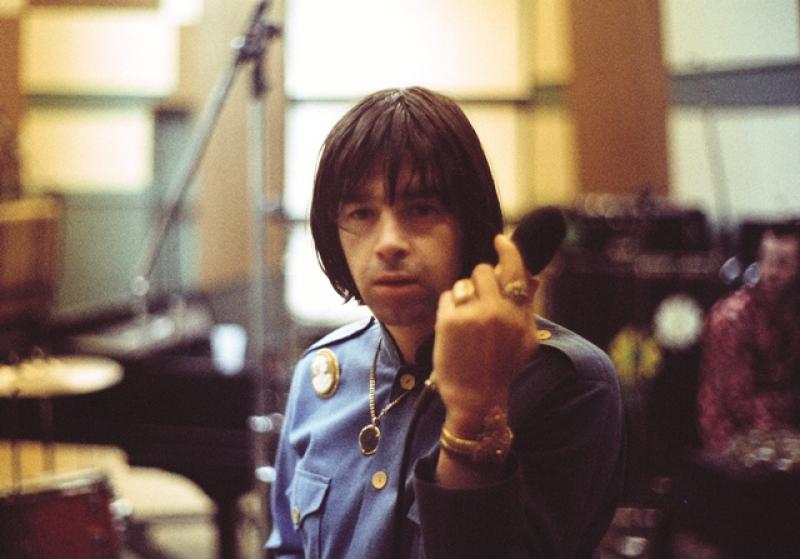
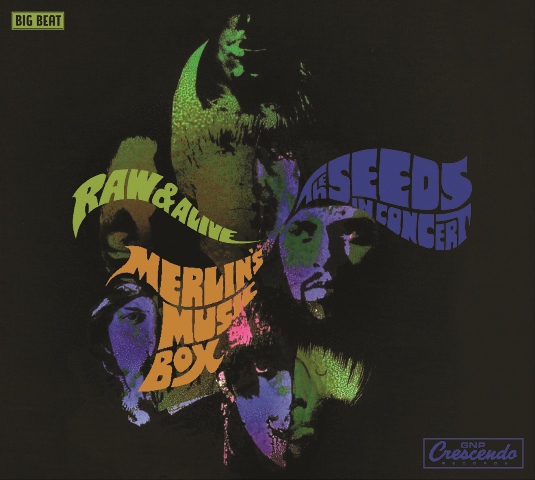 The Seeds: Raw & Alive / The Dream Syndicate: The Day Before Wine and Roses
The Seeds: Raw & Alive / The Dream Syndicate: The Day Before Wine and Roses
Two live albums. Both by bands rooted in psychedelia and based in Los Angeles. Each recorded in a studio rather than on stage. One, by The Seeds, from 1968. The other, by The Dream Syndicate, from 1982. The links between these two releases – coincidentally issued a week apart – are about more than the circumstances of their creation, geography and musical style. Both bands had brushes with the mainstream and in the form captured here both proved too raw, too unstable and too wilful to last the course.
As 1968 unfolded, The Seeds would lose their powerhouse drummer Rick Andrige. Lead Seed Sky Saxon became more and more unstable. The band fizzled out in 1970. He died in 2009. In 1983, The Dream Syndicate's bassist Kendra Smith would leave – she went on to form Clay Allison with The Rain Parade’s David Roback, who evolved into Opal and (ultimately without her) Mazzy Star. She was followed the next year by departing guitarist Karl Precoda. The band went on to normalise its sound and left the squalling, on-edge fury of The Day Before Wine and Roses behind.
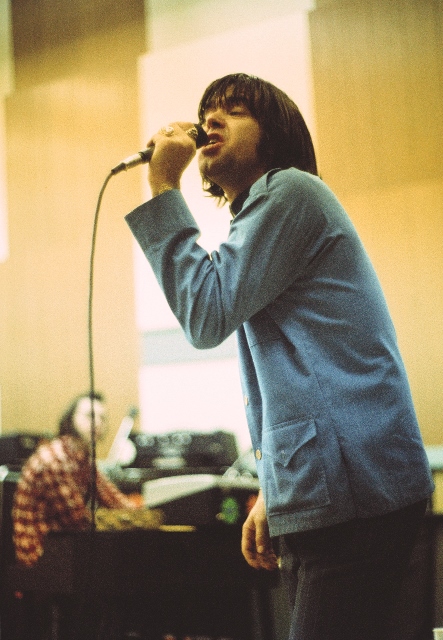 Likewise, Raw & Alive is evidence for a band so raw that many songs sound on the edge of collapsing. Saxon’s wailing is feral. Sub-titled The Seeds in Concert: Merlin’s Music Box when is was released, it seemed the real thing: a live album recorded on stage before a screaming audience But, as this extraordinary reissue more than makes clear, it was made in recording studio and the audience noise overdubbed. There wasn’t even an audience present when The Seeds made Raw & Alive at two April 1968 sessions at Western Studios. (pictured left, another shot of Sky Saxon recording Raw & Alive in the studio)
Likewise, Raw & Alive is evidence for a band so raw that many songs sound on the edge of collapsing. Saxon’s wailing is feral. Sub-titled The Seeds in Concert: Merlin’s Music Box when is was released, it seemed the real thing: a live album recorded on stage before a screaming audience But, as this extraordinary reissue more than makes clear, it was made in recording studio and the audience noise overdubbed. There wasn’t even an audience present when The Seeds made Raw & Alive at two April 1968 sessions at Western Studios. (pictured left, another shot of Sky Saxon recording Raw & Alive in the studio)
This new definitive, superbly annotated and packaged edition collects the previously unreleased naked Raw & Alive and the familiar audience-noise version as first released in May 1968. A second disc includes unheard recordings from a first, February 1968, attempt at the album which was rejected as not being powerful enough. For that attempt, a small audience had gathered in the studio.
In the event, there is not that much to choose between the two versions of the album. The rejected one is more loose and includes familiar singles “Can’t Seem to Make you Mine” (used in a UK TV ad for Lynx fragrance), “Pushin' too Hard” and “No Escape” as well as twisting, verging on free-form interpretations of album tracks “Fallin’” and “Up in Her Room”. The soon-to-be single “900 Million People Daily all Making Love” is stretched to nine minutes. The unadorned Raw & Alive is now one of the most intense, Stooges-esque live documents ever. The Doors took The Seeds eccentric no-bass, keyboards, guitar, drums and vocalist line-up to America's arenas, but their prototype was too raw and alive to similarly prosper.
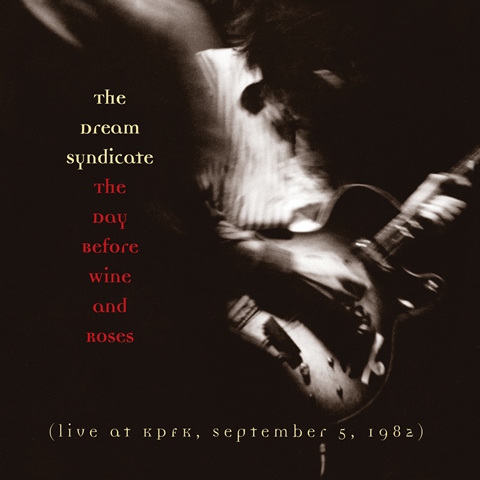 Fourteen years later, after having formed in late 1981, The Dream Syndicate were amongst a new batch of LA bands looking back to the Sixties and combos like The Seeds for inspiration. The scene would be dubbed the Paisley Underground and The Bangles became its breakout band.
Fourteen years later, after having formed in late 1981, The Dream Syndicate were amongst a new batch of LA bands looking back to the Sixties and combos like The Seeds for inspiration. The scene would be dubbed the Paisley Underground and The Bangles became its breakout band.
When The Dream Syndicate rolled up at radio station KPFK at 2am on 5 September 1982 to play for listeners and a small audience including R.E.M.'s Peter Buck, they had their debut EP under their belt and would record their first album The Days of Wine and Roses the following month.
The aptly tilted The Day Before Wine and Roses catches The Dream Syndicate at a peak. In his brief liner notes, their singer Steve Wynn says he considers the version of their debut album's title track heard here superior to the studio take. Another notable moment comes with the first outing of “Open Hour”, soon to be their signature freak-out “John Coltrane Stereo Blues”. The covers played are interesting as they are from when folkies or folk rockers went edgy: The Buffalo Springfield’s “Mr Soul”, Dylan’s “Outlaw Blues” and Donovan's “Season of the Witch”.
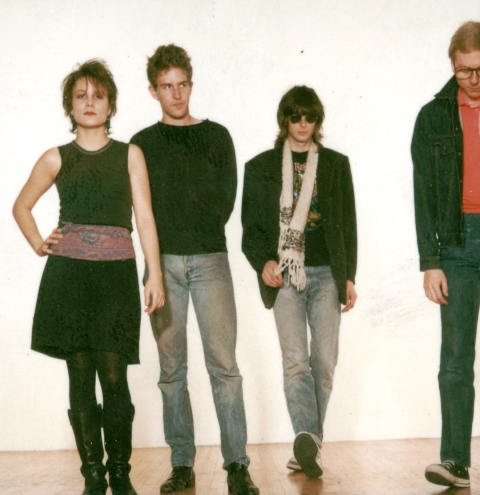 Once past Wynn’s distracting between-song garrulousness, it’s Precoda’s guitar which delineates this definitive model of the band. About texture and extremely powerful, it serves the songs. It is not about pyrotechnics. On the closing “The Days of Wine and Roses”, Wynn become so fired up, he begins barking like a dog. This amazing, unrestrained show demonstrates why The Dream Syndicate were integral to a vital musical renewal in Los Angeles, where such revitalization is often neccesary, (pictured left, the classic Dream Syndicate on Polaroid in 1982. Left to rght: Kendra Smith, Steve Wynn, Karl Precoda, Dennis Duck)
Once past Wynn’s distracting between-song garrulousness, it’s Precoda’s guitar which delineates this definitive model of the band. About texture and extremely powerful, it serves the songs. It is not about pyrotechnics. On the closing “The Days of Wine and Roses”, Wynn become so fired up, he begins barking like a dog. This amazing, unrestrained show demonstrates why The Dream Syndicate were integral to a vital musical renewal in Los Angeles, where such revitalization is often neccesary, (pictured left, the classic Dream Syndicate on Polaroid in 1982. Left to rght: Kendra Smith, Steve Wynn, Karl Precoda, Dennis Duck)
The city is the home of America’s music business. It’s where commodification and dancing with power brokers secure longevity. Yet independent-minded free spirits thrive there, and continue to do so. As well as grandly applauding two of America’s finest bands, these essential releases celebrate that spirit.
Buy
Share this article
The future of Arts Journalism
You can stop theartsdesk.com closing!
We urgently need financing to survive. Our fundraising drive has thus far raised £33,000 but we need to reach £100,000 or we will be forced to close. Please contribute here: https://gofund.me/c3f6033d
And if you can forward this information to anyone who might assist, we’d be grateful.

Subscribe to theartsdesk.com
Thank you for continuing to read our work on theartsdesk.com. For unlimited access to every article in its entirety, including our archive of more than 15,000 pieces, we're asking for £5 per month or £40 per year. We feel it's a very good deal, and hope you do too.
To take a subscription now simply click here.
And if you're looking for that extra gift for a friend or family member, why not treat them to a theartsdesk.com gift subscription?
more New music
 Music Reissues Weekly: Motor City Is Burning - A Michigan Anthology 1965-1972
Wide-ranging overview of the US state accommodating Detroit, the ‘rock city’
Music Reissues Weekly: Motor City Is Burning - A Michigan Anthology 1965-1972
Wide-ranging overview of the US state accommodating Detroit, the ‘rock city’
 theartsdesk on Vinyl: Record Store Day Special 2025
What Record Store Day exclusives are available this year?
theartsdesk on Vinyl: Record Store Day Special 2025
What Record Store Day exclusives are available this year?
 Album: Joe Lovano - Homage
Free-flowing spontaneity
Album: Joe Lovano - Homage
Free-flowing spontaneity
 Album: Bon Iver - SABLE ƒABLE
An album of exquisite wonder
Album: Bon Iver - SABLE ƒABLE
An album of exquisite wonder
 Primal Scream, O2 Academy, Birmingham review - from anthems of social justice to songs of heartbreak
Bobby Gillespie and Andrew Innes aren’t ready to join the heritage circuit yet
Primal Scream, O2 Academy, Birmingham review - from anthems of social justice to songs of heartbreak
Bobby Gillespie and Andrew Innes aren’t ready to join the heritage circuit yet
 theartsdesk on Vinyl 89: Wilco, Decius, Hot 8 Brass Band, Henge, Dub Syndicate, Motörhead and more
The last-standing and largest regular vinyl record reviews in the world
theartsdesk on Vinyl 89: Wilco, Decius, Hot 8 Brass Band, Henge, Dub Syndicate, Motörhead and more
The last-standing and largest regular vinyl record reviews in the world
 Album: Black Country, New Road - Forever Howlong
A left turn that trades chaos for charm, with mixed results
Album: Black Country, New Road - Forever Howlong
A left turn that trades chaos for charm, with mixed results
 Tallinn Music Week 2025 review - Estonia’s capital accommodates all flavours of music
The festival where everything appears on an equal footing
Tallinn Music Week 2025 review - Estonia’s capital accommodates all flavours of music
The festival where everything appears on an equal footing
 An Evening with Joan Armatrading, Cadogan Hall review - thoughtful and engaging conversation
From rock'n'roll to Open University, the singer on life and work
An Evening with Joan Armatrading, Cadogan Hall review - thoughtful and engaging conversation
From rock'n'roll to Open University, the singer on life and work
 Kenny Garrett, Ronnie Scott's review - a mixed bag
Conjuring the spirit and treading water
Kenny Garrett, Ronnie Scott's review - a mixed bag
Conjuring the spirit and treading water
 Album: Sofia Härdig - Lighthouse of Glass
Swedish singer-songwriter takes control of her music
Album: Sofia Härdig - Lighthouse of Glass
Swedish singer-songwriter takes control of her music
 Music Reissues Weekly: Ibex Band - Stereo Instrumental Music
Ethiopian jazz album from 1976 which resists easy categorisation
Music Reissues Weekly: Ibex Band - Stereo Instrumental Music
Ethiopian jazz album from 1976 which resists easy categorisation

Add comment